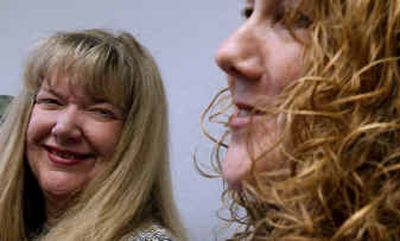Fostering comfort

Sue Cook calls each one “a miracle.” Jane Holte says, “I have so much love for these kids.” Both women are foster care and adoption parents who open their hearts and their homes to provide a safe, loving environment to children who need a safe harbor while issues within the child’s family are resolved. Many of their stories are difficult, involving serious family issues such as physical abuse, neglect, abandonment and substance abuse.
The Coeur d’Alene office of Idaho Youth Ranch partners with the Idaho Department of Health and Welfare to recruit, train and license foster homes and families.
In November 2002, Idaho Youth Ranch took over the program from Lutheran Social Services, which had to give up running the program due to budget restraints.
“We have 214 licensed foster homes in Region I, which includes the five northern counties,” says Maggie Morrison, Idaho Youth Ranch foster care social worker. “In some cases, a foster family may take care of a child for months or years and, over time, even take steps to become an adoptive parent.”
A foster care provider is an individual or family licensed to provide temporary care to children who are in the custody of the state. Foster families help children recover from abuse and neglect.
“We have 100 new kids entering foster care every year,” Morrison says.
Holte, who has been a foster care provider for 10 years, has cared for 32 kids – many of them adolescents.
She has raised three of her own children. Her 16-year-old daughter still lives at home.
“A child who needs a foster family has faced many challenges in their young life,” Holte says. “One 13-year-old boy asked me, ‘Why do I have to be in foster care? I didn’t do anything wrong’.”
Another child remarked to Holte, “I didn’t even know people like you existed.”
“It can be really tough,” Holte says. “What the children need most when they come to you is stability, love and consistency – they need boundaries.”
Holte credits her supportive family – primarily her husband, Randy, and her daughter, Kristi – as the reason why she is able to continue helping foster children.
Cook has cared for eight foster children, including three siblings, over the last seven years. She has been called “Momma Sue” by some of her foster children.
“We are looking for more children to invest our lives in, the Lord willing,” Cook says. “Children are our future.”
She adds, “It can be a demanding job, but the emotional and personal benefits can be fulfilling if you decide to make a difference in a young person’s life.”
The goal of foster care is to reunify families.
“When reunification is not possible, a child in foster care may be in need of a family willing to make a permanent commitment,” Morrison says.
Every foster child has a social worker who works in concert with foster care and adoption parents to help determine and meet the needs of children in foster care. Support groups and training opportunities are available.
“We believe one of the most important parts of foster care and adoption is education,” Morrison says. Foster and adoptive parents-to-be undergo a standardized program called Parent Resources for Information, Development, and Education.
Holte is a PRIDE trainer and says, “A major part of our home study process includes the opportunity to ask questions and discuss fundamental adoption issues with skilled professionals.”
Prospective foster parents are required to attend 27 hours of pre-service training, consisting of nine sessions.
“May is National Foster Care Month,” says Morrison. The special month is designed to draw attention to foster parenting and provide an opportunity to get more people involved, “whether as foster parents, volunteers, mentors, or in other ways,” she says.
Nationwide about 170,000 families care for over a half million children whose parents cannot take care of them.
“These resource families and the social workers, volunteers, educators, and professionals who support them quietly take on one of the greatest challenges our society generates,” Morrison says.
“Few people know how much strong love, strenuous work, and sympathetic perseverance foster parenting requires,” Morrison says. “I cherish all my families. They are the best people in the world, and they are very valued.”